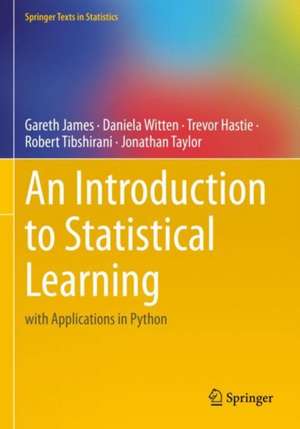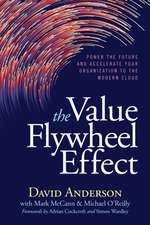An Introduction to Statistical Learning: with Applications in Python: Springer Texts in Statistics
Autor Gareth James, Daniela Witten, Trevor Hastie, Robert Tibshirani, Jonathan Tayloren Limba Engleză Paperback – 2 iul 2024
Four of the authors co-wrote An Introduction to Statistical Learning, With Applications in R(ISLR), which has become a mainstay of undergraduate and graduate classrooms worldwide, as well as an important reference book for data scientists. One of the keys to its success was that each chapter contains a tutorial on implementing the analyses and methods presented in the R scientific computing environment. However, in recent years Python has become a popular language for data science, and there has been increasing demand for a Python-based alternative to ISLR. Hence, this book (ISLP) covers the same materials as ISLR but with labs implemented in Python. These labs will be useful both for Python novices, as well as experienced users.
| Toate formatele și edițiile | Preț | Express |
|---|---|---|
| Paperback (1) | 559.21 lei 3-5 săpt. | |
| Springer International Publishing – 2 iul 2024 | 559.21 lei 3-5 săpt. | |
| Hardback (1) | 733.31 lei 3-5 săpt. | |
| Springer International Publishing – iul 2023 | 733.31 lei 3-5 săpt. |
Din seria Springer Texts in Statistics
-
 Preț: 400.59 lei
Preț: 400.59 lei -
 Preț: 253.63 lei
Preț: 253.63 lei - 18%
 Preț: 903.62 lei
Preț: 903.62 lei - 20%
 Preț: 700.50 lei
Preț: 700.50 lei -
 Preț: 477.28 lei
Preț: 477.28 lei - 15%
 Preț: 676.86 lei
Preț: 676.86 lei - 20%
 Preț: 692.84 lei
Preț: 692.84 lei -
 Preț: 359.53 lei
Preț: 359.53 lei - 20%
 Preț: 567.29 lei
Preț: 567.29 lei - 20%
 Preț: 633.81 lei
Preț: 633.81 lei - 18%
 Preț: 695.28 lei
Preț: 695.28 lei - 15%
 Preț: 624.82 lei
Preț: 624.82 lei - 20%
 Preț: 697.47 lei
Preț: 697.47 lei - 20%
 Preț: 643.53 lei
Preț: 643.53 lei - 17%
 Preț: 525.26 lei
Preț: 525.26 lei - 17%
 Preț: 428.39 lei
Preț: 428.39 lei - 19%
 Preț: 571.78 lei
Preț: 571.78 lei - 13%
 Preț: 486.96 lei
Preț: 486.96 lei - 20%
 Preț: 764.91 lei
Preț: 764.91 lei - 15%
 Preț: 650.86 lei
Preț: 650.86 lei -
 Preț: 403.75 lei
Preț: 403.75 lei -
 Preț: 403.37 lei
Preț: 403.37 lei - 19%
 Preț: 626.92 lei
Preț: 626.92 lei - 18%
 Preț: 948.29 lei
Preț: 948.29 lei - 18%
 Preț: 746.59 lei
Preț: 746.59 lei -
 Preț: 500.46 lei
Preț: 500.46 lei - 18%
 Preț: 952.09 lei
Preț: 952.09 lei -
 Preț: 394.71 lei
Preț: 394.71 lei - 15%
 Preț: 584.26 lei
Preț: 584.26 lei - 15%
 Preț: 702.54 lei
Preț: 702.54 lei -
 Preț: 407.01 lei
Preț: 407.01 lei - 18%
 Preț: 895.89 lei
Preț: 895.89 lei - 15%
 Preț: 600.80 lei
Preț: 600.80 lei - 23%
 Preț: 684.77 lei
Preț: 684.77 lei - 19%
 Preț: 543.05 lei
Preț: 543.05 lei - 15%
 Preț: 595.86 lei
Preț: 595.86 lei -
 Preț: 423.18 lei
Preț: 423.18 lei - 15%
 Preț: 656.10 lei
Preț: 656.10 lei - 15%
 Preț: 682.90 lei
Preț: 682.90 lei - 18%
 Preț: 814.43 lei
Preț: 814.43 lei -
 Preț: 402.76 lei
Preț: 402.76 lei -
 Preț: 408.54 lei
Preț: 408.54 lei - 18%
 Preț: 759.52 lei
Preț: 759.52 lei
Preț: 559.21 lei
Preț vechi: 657.89 lei
-15% Nou
Puncte Express: 839
Preț estimativ în valută:
107.01€ • 111.09$ • 89.23£
107.01€ • 111.09$ • 89.23£
Carte disponibilă
Livrare economică 03-17 martie
Preluare comenzi: 021 569.72.76
Specificații
ISBN-13: 9783031391897
ISBN-10: 3031391896
Pagini: 60
Ilustrații: XV, 60 p. 600 illus., 575 illus. in color.
Dimensiuni: 178 x 254 x 32 mm
Greutate: 1.3 kg
Ediția:2023
Editura: Springer International Publishing
Colecția Springer
Seria Springer Texts in Statistics
Locul publicării:Cham, Switzerland
ISBN-10: 3031391896
Pagini: 60
Ilustrații: XV, 60 p. 600 illus., 575 illus. in color.
Dimensiuni: 178 x 254 x 32 mm
Greutate: 1.3 kg
Ediția:2023
Editura: Springer International Publishing
Colecția Springer
Seria Springer Texts in Statistics
Locul publicării:Cham, Switzerland
Cuprins
Introduction.- Statistical Learning.- Linear Regression.- Classification.- Resampling Methods.- Linear Model Selection and Regularization.- Moving Beyond Linearity.- Tree-Based Methods.- Support Vector Machines.- Deep Learning.- Survival Analysis and Censored data.- Unsupervised Learning.- Multiple Testing.- Index.
Recenzii
“The book adopts a hands-on, practical approach to teaching statistical learning, featuring numerous examples and case studies, accompanied by Python code for implementation. It stands as a contemporary classic, offering clear and intuitive guidance on how to implement cutting-edge statistical and machine learning methods. If you wish to intelligently use data analytics tools and techniques for analyzing big and/or complex data, this book should be front and center on your bookshelf.” (David Han, Mathematical Reviews, May 10, 2024)
Notă biografică
Gareth James is the John H. Harland Dean of Goizueta Business School at Emory University. He has published an extensive body of methodological work in the domain of statistical learning with particular emphasis on high-dimensional and functional data. The conceptual framework for this book grew out of his MBA elective courses in this area.
Daniela Witten is a professor of statistics and biostatistics, and the Dorothy Gilford Endowed Chair, at University of Washington. Her research focuses largely on statistical machine learning techniques for the analysis of complex, messy, and large-scale data, with an emphasis on unsupervised learning.
Trevor Hastie and Robert Tibshirani are professors of statistics at Stanford University and are co-authors of the successful textbook Elements of Statistical Learning. Hastie and Tibshirani developed generalized additive models and wrote a popular book with that title. Hastie co-developed much of the statistical modeling software and environment in R, and invented principal curves and surfaces. Tibshirani invented the lasso and is co-author of the very successful book, An Introduction to the Bootstrap. They are both elected members of the US National Academy of Sciences.
Jonathan Taylor is a professor of statistics at Stanford University. His research focuses on selective inference and signal detection in structured noise.
Daniela Witten is a professor of statistics and biostatistics, and the Dorothy Gilford Endowed Chair, at University of Washington. Her research focuses largely on statistical machine learning techniques for the analysis of complex, messy, and large-scale data, with an emphasis on unsupervised learning.
Trevor Hastie and Robert Tibshirani are professors of statistics at Stanford University and are co-authors of the successful textbook Elements of Statistical Learning. Hastie and Tibshirani developed generalized additive models and wrote a popular book with that title. Hastie co-developed much of the statistical modeling software and environment in R, and invented principal curves and surfaces. Tibshirani invented the lasso and is co-author of the very successful book, An Introduction to the Bootstrap. They are both elected members of the US National Academy of Sciences.
Jonathan Taylor is a professor of statistics at Stanford University. His research focuses on selective inference and signal detection in structured noise.
Textul de pe ultima copertă
An Introduction to Statistical Learning provides an accessible overview of the field of statistical learning, an essential toolset for making sense of the vast and complex data sets that have emerged in fields ranging from biology to finance, marketing, and astrophysics in the past twenty years. This book presents some of the most important modeling and prediction techniques, along with relevant applications. Topics include linear regression, classification, resampling methods, shrinkage approaches, tree-based methods, support vector machines, clustering, deep learning, survival analysis, multiple testing, and more. Color graphics and real-world examples are used to illustrate the methods presented. This book is targeted at statisticians and non-statisticians alike, who wish to use cutting-edge statistical learning techniques to analyze their data.
Four of the authors co-wrote An Introduction to Statistical Learning, With Applications in R (ISLR), which has become a mainstay of undergraduate and graduate classrooms worldwide, as well as an important reference book for data scientists. One of the keys to its success was that each chapter contains a tutorial on implementing the analyses and methods presented in the R scientific computing environment. However, in recent years Python has become a popular language for data science, and there has been increasing demand for a Python-based alternative to ISLR. Hence, this book (ISLP) covers the same materials as ISLR but with labs implemented in Python. These labs will be useful both for Python novices, as well as experienced users.
Four of the authors co-wrote An Introduction to Statistical Learning, With Applications in R (ISLR), which has become a mainstay of undergraduate and graduate classrooms worldwide, as well as an important reference book for data scientists. One of the keys to its success was that each chapter contains a tutorial on implementing the analyses and methods presented in the R scientific computing environment. However, in recent years Python has become a popular language for data science, and there has been increasing demand for a Python-based alternative to ISLR. Hence, this book (ISLP) covers the same materials as ISLR but with labs implemented in Python. These labs will be useful both for Python novices, as well as experienced users.
Caracteristici
Presents an essential statistical learning toolkit for practitioners in science, industry, and other fields Demonstrates application of the statistical learning methods in Python Covers regression, classification, tree methods, SVM, clustering, survival analysis, deep learning


